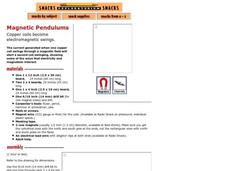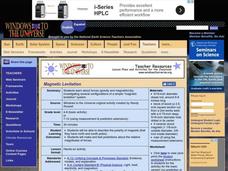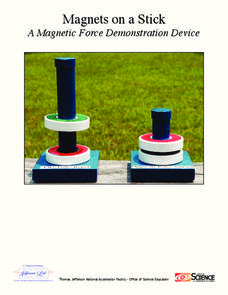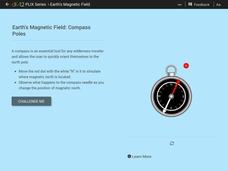Curated OER
True North, Magnetic North
Students explain why compass angles need to be corrected for regional magnetic variation. They observe the difference between magnetic and true north. Each student measures the angle of variation for a town in a different state.
Curated OER
Terrabagga Activity Using a Magnetometer
Clever! Earth science learners construct a model of a planet containing a magnetic core. The planet, Terrabagga, is made out of a paper grocery bag, magnets, a dead D battery, and rubber bands. Pictures of each step of the construction...
Curated OER
Magnetic Turtles
Students encounter how magnetic forces affect the navigation ability of sea turtle hatchings. Research is done to find out where the true magnetic North Pole lies. Exploration is discussed on how many things here on earth are affected by...
Curated OER
Earth's Poles
In this Earth's Poles activity, learners survey, examine and dissect the North and South Magnetic Poles, the Earth's axis and summarize the Aurora legends. Students research six directives involving space weather and predicting answers.
Curated OER
Magnetism
All phenomena concerning magnets, their field lines and impact on objects are covered. The trivia surrounding field lines and the earth, electric charges, repulsion and attraction is plentiful. The slide show continues after twenty...
Curated OER
Magnetism
In this physics worksheet, students fill in 14 blanks involving the Domain Theory of Magnetism. Students interact with a variety of aspects dealing with magnets.
Curated OER
Magnetism
A wonderfully rich presentation teaches about magnets and magnetism. Each slide is packed with interesting information on the discovery, history, physics, and uses for magnets. Good photographs, and an emphasis on vocabulary are part of...
Exploratorium
Magnetic Pendulums
Passing a copper wire coil through a magnetic field influences another coil to also sway. It is with this demonstration that you can teach your physical science fans about electromagnetism. Note that the assembly requires about an hour,...
Curated OER
Magnetic Levitation
A thorough investigation of magnetic levitation; this activity has four parts. First, physical scientists play with a wooden dowel and three disc magnets to review polarity and repelling action. Then they experiment with...
Urbana School District
Magnetism
The compass was first used in 206 B.C., but we didn't discover magnetic poles until 1263 A.D. Presentation begins with the history of magnetism before continuing on to magnetic fields, magnetic forces, electromagnets, currents,...
Curated OER
Magnet Circus
Students explore the properties of magnets by designing a device that can move as far as possible using only magnets to move it, and design a machine that will stay in motion for the greatest period of time.
Curated OER
Magnetism
This set of seven activities attracts physical science stars to concepts concerning magnetism. Pupils play with a lodestone, magnets, needles, and iron filings to understand magnetic forces, fields, and applications. If you are new to...
Curated OER
Compass Deviation
High schoolers identify and describe the difference between the magnetic north pole and true north. They consider why sailors could not steer a straight course to the New World from the Old.
K12 Reader
Magnetic Attraction
Teach your class about magnets and electromagnets with a reading passage. After reading the passage, learners respond to five related questions.
US Department of Energy
Magnets on a Stick: A Magnetic Force Demonstration Device
Why do some magnets attract while others repel? Scholars use clearly labeled permanent magnets to explore the attractive question. They compare the behavior of like versus opposite poles to find the answer.
CK-12 Foundation
Earth's Magnetic Field: Compass Poles
You'll be strangely drawn to this activity! Physical science pupils learn how compasses work in an interesting interactive. The content covers magnetic poles, Earth's magnetic field, and what would happen if Earth's poles swapped places.
Curated OER
Typical Numeric Questions for Physics I - Magnetism
Most of these questions are actually not numeric in nature as the title indicates, but they are pertinent to a high school physics curriculum covering magnetic fields. Young scientists must be adept at handling the right hand rule in...
Curated OER
Magnificent Magnets
Students identify the properties of a magnet. In this physics instructional activity, students explore the strength of the magnet by testing out how a magnet reacts to various materials. The various objects the students test include...
Mr. E. Science
Magnetism and Electromagnetism
The biggest magnet in the world is at the Los Alamos National Laboratory in New Mexico and can reach 100 tesla. By comparison, magnets that lift cars are about two tesla. The 11th presentation in this series covers magnetism,...
Curated OER
Electricity/Magnetism
Fourth graders explore magnets as fundamental parts of generators and how they are used to produce current electricity. They distinguish between the north and south pole of magnets and the difference between repel and attract. Students...
Bowels Physics
Magnetic Fields and Forces
Every knows that opposites attract! Here's a presentation that uses this background knowledge to explain magnetic fields and forces. The resource also explains the shape of magnetic fields and how to determine the direction of forces.
Curated OER
Magnets
In this magnets worksheet, learners read for information, observe diagrams, and experiment. In this identifying the correct answer and T-Chart worksheet, students answer nine questions.
Curated OER
Magnetism
Second graders conduct a variety of inquiry based learning activities. In this magnetism lesson, 2nd graders explore magnets with a partner, they learn the terms attract and repel, examine the poles of a magnet, and complete other...
Curated OER
The North and South Magnetic Poles
In this north and south magnetic poles worksheet, students read about the presence of auroras over the earth's magnetic poles as opposed to the geographic poles. Students use 2 photographs taken by the IMAGE FUV and the Polar instruments...

























